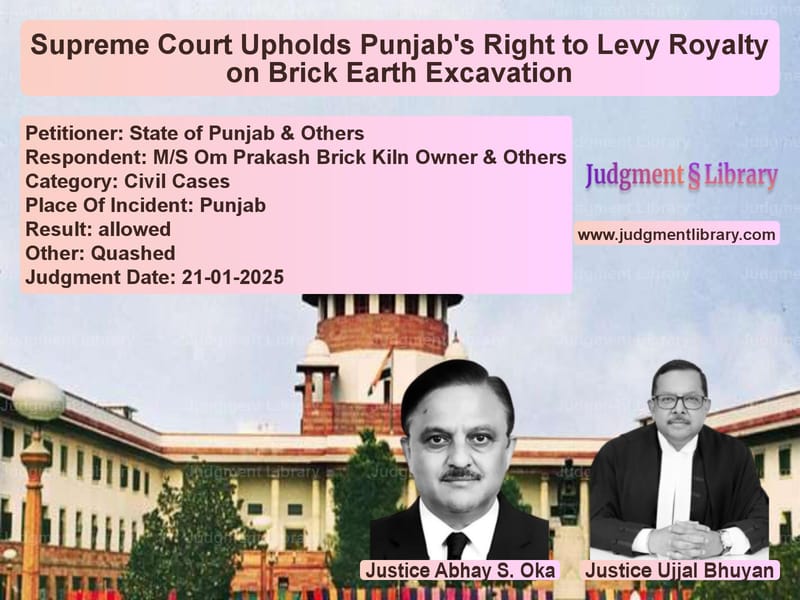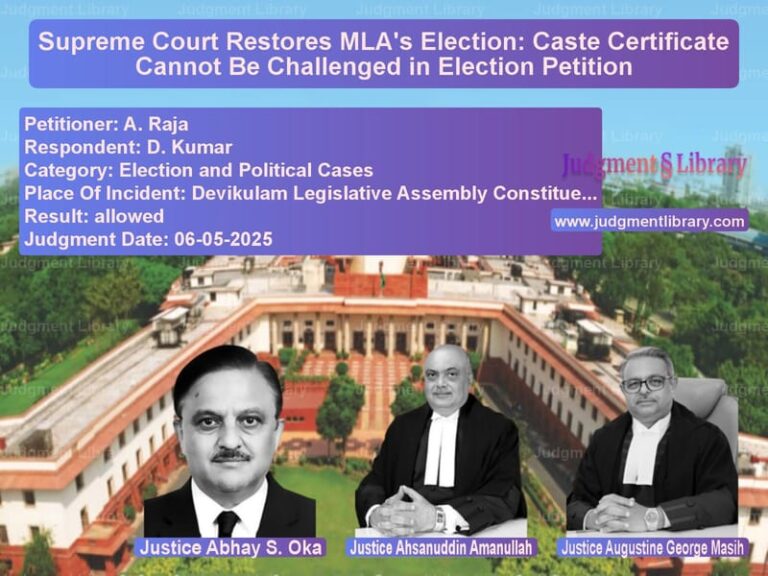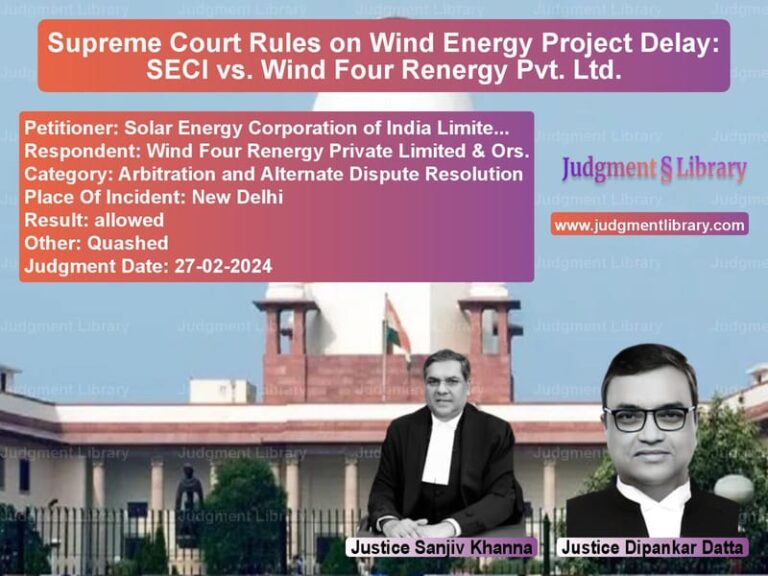Supreme Court Upholds Punjab’s Right to Levy Royalty on Brick Earth Excavation
The Supreme Court of India has delivered a landmark ruling in the case of State of Punjab & Others vs. M/S Om Prakash Brick Kiln Owner & Others, addressing the longstanding dispute over the state’s authority to levy royalty on brick earth excavation. The judgment overturned the Punjab and Haryana High Court’s decision that had favored brick kiln operators, affirming the state’s power to impose royalty under the Mines and Minerals (Regulation and Development) Act, 1957.
Background of the Case
The case involved multiple brick kiln owners operating in Punjab who filed suits seeking a permanent injunction against the State of Punjab. They challenged the state’s authority to assess, levy, and recover royalty for the use of brick earth, arguing that such imposition was illegal. The dispute primarily revolved around whether brick earth was a minor mineral under the Mines and Minerals (Regulation and Development) Act, 1957 (the 1957 Act) and whether the state could levy royalty under the Punjab Minor Mineral Concession Rules, 1964.
The brick kiln owners contended that their excavation was done on privately owned land, and therefore, the state had no jurisdiction to impose royalty. They cited Section 42(2) of the Punjab Land Revenue Act, 1887, arguing that brick earth was not government property and thus could not be taxed.
Arguments by the Appellants (State of Punjab)
The State of Punjab, represented by the Additional Advocate General, made the following arguments:
- Brick earth was declared a minor mineral under Section 3(e) of the 1957 Act through a notification dated June 1, 1958.
- The Punjab Minor Mineral Concession Rules, 1964, authorized the state to impose royalty on minor minerals, including brick earth.
- Under Section 15 of the 1957 Act, the state government was empowered to make rules for regulating the extraction and use of minor minerals.
- Section 42(1) of the Punjab Land Revenue Act, 1887, created a presumption that minerals, including brick earth, belonged to the state unless explicitly recorded otherwise.
- The plaintiffs had not proven ownership of the minerals in their respective lands, nor had they challenged the state’s notification declaring brick earth as a minor mineral.
Arguments by the Respondents (Brick Kiln Owners)
The brick kiln owners argued:
- The government had no right to levy royalty on brick earth excavated from private lands.
- The Wajib-ul-arz (record of rights) did not expressly state that brick earth belonged to the government.
- The state had failed to provide evidence that it was the legal owner of the brick earth.
- Brick earth was primarily used for manufacturing bricks and not as a mined mineral.
- The levy of royalty amounted to double taxation as brick kilns already paid land revenue.
Supreme Court’s Analysis and Judgment
1. Validity of Levying Royalty on Brick Earth
The Court held that brick earth was lawfully classified as a minor mineral under Section 3(e) of the 1957 Act. Consequently, the state had the authority to impose royalty on its extraction.
“Once brick earth is notified as a minor mineral, the state is within its legal rights to regulate its extraction and impose royalty as per the Punjab Minor Mineral Concession Rules, 1964.”
2. Ownership of Brick Earth
The Court referred to Section 42(1) of the Punjab Land Revenue Act, 1887, which states that if any record-of-rights was completed before November 18, 1871, and did not explicitly mention ownership of minerals by landowners, such minerals were presumed to belong to the government.
“The respondents failed to rebut the presumption that brick earth was a state-owned mineral as per Section 42(1).”
3. Authority Under the 1957 Act
The Court upheld the state’s power to impose royalty under Section 15 of the 1957 Act:
“Section 15 grants state governments the power to make rules for minor minerals, including the levy of royalty. The Punjab Minor Mineral Concession Rules, 1964, have been lawfully enacted under this provision.”
4. Rejection of High Court’s Findings
The Supreme Court found that the High Court had erred in concluding that the state lacked ownership over brick earth. It ruled that the High Court overlooked relevant statutory provisions and failed to consider the legal presumption in favor of state ownership.
“The High Court misinterpreted Section 42(2) of the Punjab Land Revenue Act, ignoring that the burden of proving private ownership of brick earth lay on the plaintiffs.”
5. Right to Levy Royalty Irrespective of Land Ownership
The Court ruled that even if the land was privately owned, the government could still levy royalty on brick earth as a minor mineral:
“The nature of the material, not the ownership of land, determines the state’s right to impose royalty.”
Final Judgment
The Supreme Court allowed the appeal and set aside the Punjab and Haryana High Court’s judgment:
“The High Court’s order is quashed. The suits filed by the respondents are dismissed, and the state is entitled to recover royalty from brick kiln operators as per the Punjab Minor Mineral Concession Rules, 1964.”
Conclusion
This judgment reaffirms the state’s authority to regulate and levy royalty on minor minerals, including brick earth. The ruling clarifies that ownership of land does not automatically confer ownership of minerals beneath it. By overturning the High Court’s ruling, the Supreme Court has set a strong precedent for state governments to exercise their powers under the 1957 Act without legal ambiguity.
Petitioner Name: State of Punjab & Others.Respondent Name: M/S Om Prakash Brick Kiln Owner & Others.Judgment By: Justice Abhay S. Oka, Justice Ujjal Bhuyan.Place Of Incident: Punjab.Judgment Date: 21-01-2025.
Don’t miss out on the full details! Download the complete judgment in PDF format below and gain valuable insights instantly!
Download Judgment: state-of-punjab-&-ot-vs-ms-om-prakash-brick-supreme-court-of-india-judgment-dated-21-01-2025.pdf
Directly Download Judgment: Directly download this Judgment
See all petitions in Property Disputes
See all petitions in Damages and Compensation
See all petitions in Contract Disputes
See all petitions in Judgment by Abhay S. Oka
See all petitions in Judgment by Ujjal Bhuyan
See all petitions in allowed
See all petitions in Quashed
See all petitions in supreme court of India judgments January 2025
See all petitions in 2025 judgments
See all posts in Civil Cases Category
See all allowed petitions in Civil Cases Category
See all Dismissed petitions in Civil Cases Category
See all partially allowed petitions in Civil Cases Category







